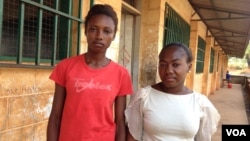In an attempt to deal with a rise in sexual violence and teenage pregnancies in Sierra Leone during the Ebola crisis, the country’s government has moved to address the issue through an alternative education initiative.
Under a program started in October, many pregnant girls previously barred from attending school now have classes available to them. The classes are also available to lactating mothers.
Elizabeth Issa, 17, is just one of thousands of young girls across the country taking alternative classes being offered under the new program. She has a seven-month-old daughter, who is watched by her parents when she is in school.
She prefers this kind of classroom setting because often shame is brought on girls who get pregnant while still in school, she explains in her native Krio dialect.
Elizabeth says that when she was pregnant she felt a bit embarrassed and stayed inside her house, but she says she feels better being in school with girls sharing the same experience.
The alternative schools have been successful, according to Olive Musa, the head of non-formal education at Sierra-Leone’s Ministry of Education, Science and Technology.
She says an estimated 11,000 girls have registered for the schools. Originally, the classes were offered only to those who got pregnant during the Ebola crisis, but others were so eager participate that the program was expanded.
Still shortcomings
But not everyone is on board with the new concept.
Human rights group Amnesty International says even though there are alternative classes, students are still not allowed to take exams to get into senior secondary school or college if they are visibly pregnant, and there are no alternative options for that.
In an email to VOA, West African Amnesty researcher Sabrina Mahtani said "The government must act to protect girls' right to non-discrimination and education, and this means protecting their right to continue on in mainstream schools and sit exams equally with others, should they wish to do so," she said.
Mahtani also said the schools' alternative curriculum must be monitored to determine the quality of education. Currently, classes are held just three times a week for a couple of hours.
Piecemeal approach
But Musa says the attitudes cannot change overnight.
“I do not think it is morally right, and considering the culture we have, we are yet to reach that point for accepting that if you are visibly pregnant, you can take exams with those who are not. Of course in college, universities, no one cares, but at that tender age, people will want to frown on it,” Musa said.
She added that the government is looking at methods to ensure student pregnancies are reduced.
“That is why we have to intensify the family planning, the sexual reproductive health programs, so that at least we teach them about prevention.”
For now, the only option is the alternative classes.
Elizabeth Issa, who wants to be a banker, says she feels she is learning enough, but admits some of her peers wanted to attend the mainstream schools, even while pregnant.




